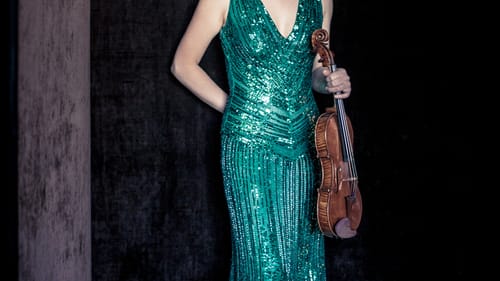Stay in the Loop
BSR publishes on a weekly schedule, with an email newsletter every Wednesday and Thursday morning. There’s no paywall, and subscribing is always free.
Dazzling in the heart of the repertoire
Philadelphia Orchestra presents Tchaikovsky’s Violin Concerto

The program didn’t look particularly inspired: two old symphonies in C major and a warhorse violin concerto. But just leave it to Yannick Nézet-Séguin. Still early in the current season, the maestro, musicians, and a soloist of dazzling virtuosity transformed modest expectations into rapturous realities during the Philadelphia Orchestra’s late September concert in the Kimmel Center.
The program had a Nordic theme, if one agrees with Nézet-Séguin’s introductory comments, in which St. Petersburg snuggled up to Finland and Sweden to expand our definition of Scandinavia.
Do quit your day job
The concert opened with the seldom-heard Symphony No. 3 in C major (the Singulière) by the seldom-performed Franz Berwald (1796-1868), a prolific Swedish composer whose day jobs included surgeon and manager of a glassworks, a sawmill, and a brick factory. But don’t be misled by these blue-collar predispositions. Berwald’s symphony is aflame with originality, variety, and sometimes startling surprise. I loved this work, especially as interpreted with enthusiasm and abandon by the conductor and ensemble.
The work sounds like program music without a program, opening with a sense of the world gradually awakening from sleep, woodwinds hatching out of nests of sound spun by the strings. The music is charming, sometimes very light, even gamboling, but abrupt shifts in sonority and sudden stops remind us that it is Berwald, not our imaginations, in charge. The second movement has its dreamy moments, seeming to foreshadow Ravel’s Mother Goose with its surging lyricism. The final movement was richly expressive, full of melodies that tease us with their potential, then stop abruptly before reaching it. The conductor was in his element as the work ended with energy and aplomb.
A universe of music
The second work was Sibelius’s last symphony, Symphony No. 7 in C major. This extraordinary work, around 20 minutes long, is a single movement whose musical ideas are developed and displayed through rhythmic variety and ingenious orchestration rather than through key changes. This short, absorbing work unleashes Sibelius’s creativity. From a simple C major scale at the beginning, the composer elicits a universe of musical effects, ranging from melodic whispers — a few measures from the oboe, a melodic line in the flute — to massive sheets of sound scraping against each other like tectonic plates.
The brass section gets a stunning workout, with some passages in the trombones (led by principal Nitzan Haroz) so heartfelt and arresting I felt I was hearing Sibelius in a completely new light, one that exposed the composer’s deepest feelings, which are sometimes weighed down and obscured by the heaviness of his thoughts.
The work seems to feed off of itself, nourished by previous passages as it builds to a brief but astonishing conclusion that reminded me, in spirit, of parts of Carl Ruggles’s Sun-Treader: a relentless swelling of sound, unafraid of discord or disharmony, flying fearlessly into the face of eternity.

Look out for Lisa Batiashvili
The second half of the program was devoted to Tchaikovsky’s Violin Concerto in D major, one of a half-dozen core violin concertos at the heart of any great violinist’s repertoire. What could be more familiar, soothing, predictable?
Again, both the soloist and the Orchestra contravened expectations, transforming and in some ways illuminating the work. As with all timeless classics, it has the potential to take on an endless array of personalities, with few more vivid and engaging than this rendition, thanks to a thrilling performance by violinist Lisa Batiashvili.
Born in the Republic of Georgia and now living in Germany, Batiashvili may not be a familiar name to many concertgoers in the U.S., but that could very well change — and soon. From the first sweep of her bow, the familiar notes rang clear and true. Throughout the rhapsodic first movement, conducted at a brisk pace by Nézet-Séguin, Batiashvili brought a bright tone and nimble fingerings to a work that is as difficult as it is lovely. Throaty low notes and keen expression in the upper register made it seem fresh and new, an attitude reflected in the orchestra’s keen approach.
I love the way Nézet-Séguin engages with soloists, turning to face them, making eye contact with a smile of encouragement. But Batiashvili did not need encouragement from anyone. She was in command, and her spectacular reading of the cadenza — those high, individual notes clarion-clear and faultless — is something I am not going to forget.
In the second and third movements, the soloist alternated between lyricism and vigor, always in balance with the orchestra, maintaining a tone on her 1739 Guarneri violin as sensuous as liquid gold. Following a standing ovation, the soloist returned to play the sixth of the Six Romances by Tchaikovsky, concluding a concert full of adventure and unexpected delight.
What, When, Where
Tchaikovsky Violin Concerto. Lisa Batiashvili, violin; Yannick Nézet-Séguin, conductor. The Philadelphia Orchestra. Berwald, Symphony No. 3 in C major (the Singulière); Sibelius, Symphony No. 7 in C major, Op. 105; and Tchaikovsky, Violin Concerto in D major, Op. 35. September 20 through 22, 2018, at the Kimmel Center’s Verizon Hall, 300 S. Broad Street, Philadelphia. (215) 893-1999 or philorch.org.
Sign up for our newsletter
All of the week's new articles, all in one place. Sign up for the free weekly BSR newsletters, and don't miss a conversation.

 Linda Holt
Linda Holt